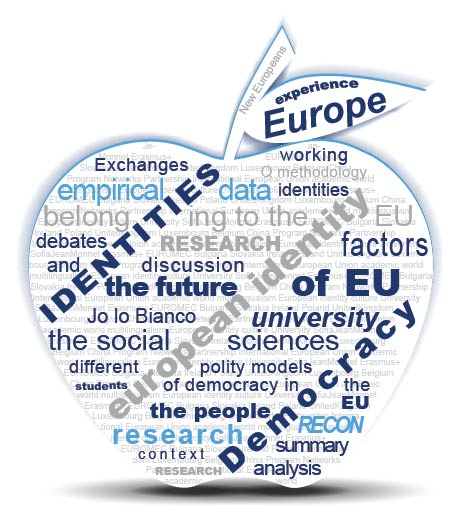Research strand 1: Identities and Democracy. Frameworks of identity constructions in Europe.
The research is aimed at combining theoretically informed conceptual framework with a novel methodological approach for empirically measuring subjective European identity constructions. It is mapped within the expanding research agenda about European identity by expanding the scope of the empirical research carried out under an Integrated Project under the European Commission’s 6 Framework Programme for Research Reconstructing Democracy in Europe (RECON). It is based on an analytical framework of three European identity constructions correlated to different polity models of democracy in the EU (EU as a confederation of sovereign democratic states, EU as multinational federal democratic state and EU as regional democratic non-state) (Eriksen and Fossum (2007)). This is particularly relevant to the current state of debates and discussion of the future of the EU. It aims at applying Q methodology as a research method thus ensuring coherence with research activity 2, where the application of the same innovative methodology is envisaged. The two research strands will particularly benefit from the commitment of Jo lo Bianco as member of the Advisory Board of the Network, a pioneer in applying this methodology in the context of political studies.
The research provides opportunities to measure empirically European identity of university students and young researchers, studying EU related subjects or doing research in the social sciences or the humanities. The group of respondents will be designed to cover students and young researchers from New member states (Bulgaria and Slovakia) and will include academics from the three partner universities (Sofia University, University in Banska Bistriza and Jagellonian University).
The methodology is based on two assumptions. It operationalises the knowledge deficit about the EU and empirically aims at going beyond the statement that it is a major factor for lack of feeling of belonging to the EU. It also aims at going beyond the Eurobarometer surveys methodology which is framed in the dichotomy of European and national identity. The methodology is targeted towards students and young academics in new EU member states from the Eastern enlargement, which relates to the topic of the seminar Identity, Values and Borders in Europe and its subtopic on the case of cultural diversity and Europe’s East enlargement.
The methodology draws upon a survey conducted with Polish university students under the RECON project by researcher from the Jagellonian University, Poland (partner of the JM Network).
The research will make a novel contribution to measuring empirically subjective patterns of European identification among young people – students and young academics. The findings of the patterns of identifications with the EU of this target group is theoretically significant because the knowledge gap of insufficient knowledge about the EU and its functioning and effects of its policies in citizens’ everyday life is often viewed as a major factor for lack of identification with the EU and increasing euroscepticism. It will give insights into the better understanding of the subjective constructions of meaning of European citizenship and the role of democratic norms and practices that shape citizens’ identification with the EU.
- Academic papers for specialised journals in the partner countries (BG, SK)
- Working paper in the Network series.
- Joint publication in English in a specialised journal.
